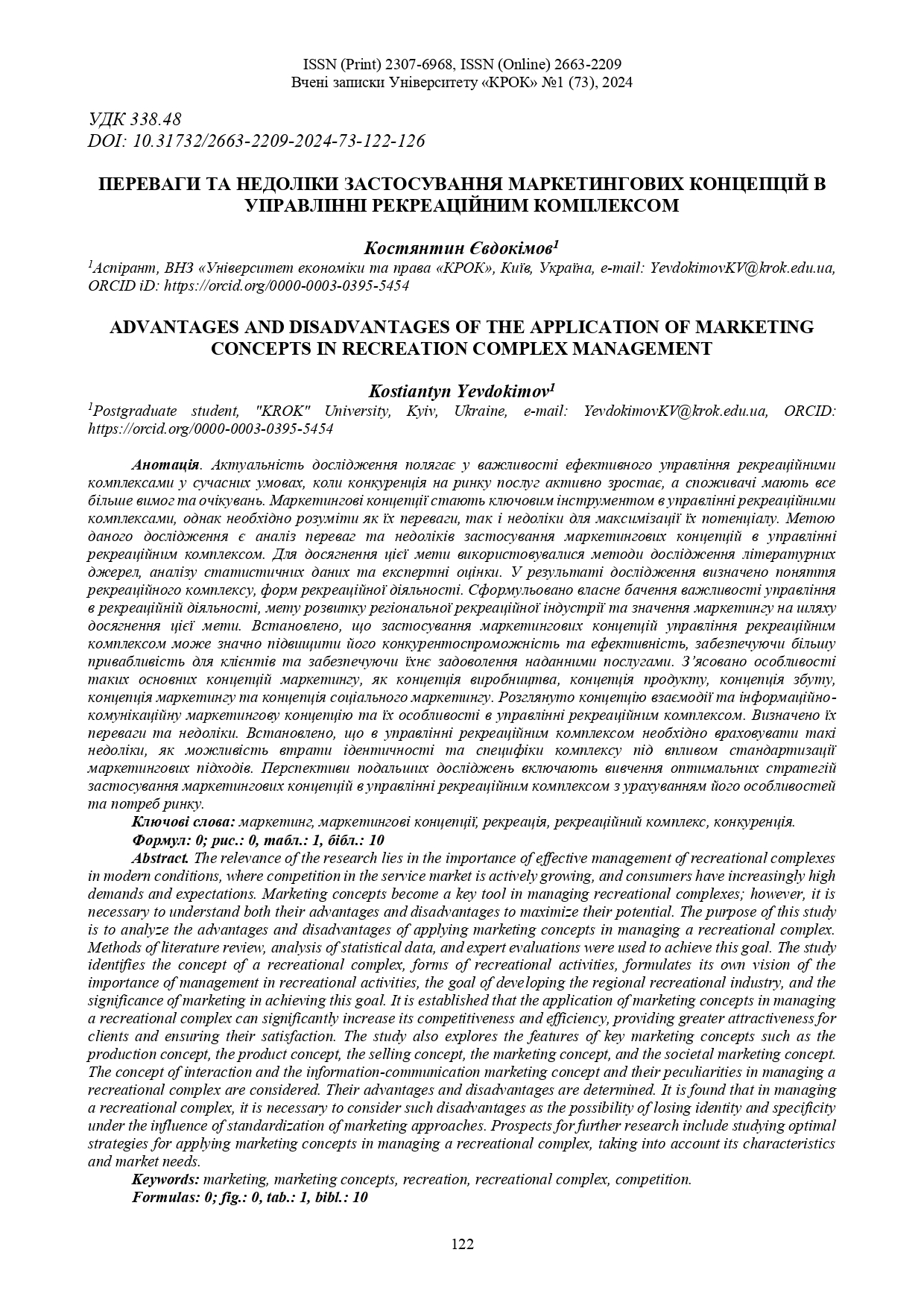ADVANTAGES AND DISADVANTAGES OF THE APPLICATION OF MARKETING CONCEPTS IN RECREATION COMPLEX MANAGEMENT
DOI:
https://doi.org/10.31732/2663-2209-2024-73-122-126Keywords:
marketing, marketing concepts, recreation, recreation complex, competitionAbstract
The relevance of the research lies in the importance of effective management of recreational complexes in modern conditions, where competition in the service market is actively growing, and consumers have increasingly high demands and expectations. Marketing concepts become a key tool in managing recreational complexes; however, it is necessary to understand both their advantages and disadvantages to maximize their potential. The purpose of this study is to analyze the advantages and disadvantages of applying marketing concepts in managing a recreational complex. Methods of literature review, analysis of statistical data, and expert evaluations were used to achieve this goal. The study identifies the concept of a recreational complex, forms of recreational activities, formulates its own vision of the importance of management in recreational activities, the goal of developing the regional recreational industry, and the significance of marketing in achieving this goal. It is established that the application of marketing concepts in managing a recreational complex can significantly increase its competitiveness and efficiency, providing greater attractiveness for clients and ensuring their satisfaction. The study also explores the features of key marketing concepts such as the production concept, the product concept, the selling concept, the marketing concept, and the societal marketing concept. The concept of interaction and the information-communication marketing concept and their peculiarities in managing a recreational complex are considered. Their advantages and disadvantages are determined. It is found that in managing a recreational complex, it is necessary to consider such disadvantages as the possibility of losing identity and specificity under the influence of standardization of marketing approaches. Prospects for further research include studying optimal strategies for applying marketing concepts in managing a recreational complex, taking into account its characteristics and market needs.Downloads
References
Bright, A. D. (2000). The Role of Social Marketing in Leisure and Recreation Management. Journal of Leisure Research Copyright, 32, 12-17.
Kantyka, J., Siguencia, L. O. & Nagody-Mrozowicz, K. (2019). Marketing management in recreational organisations. Society. Integration. Education. Proceedings of the International Scientific Conference, VI, 248-257.
Kotler, P. (2000). Marketing Management. Upper Saddle River, New Jersey: Prentice Hall.
Mahoney, E. M. (1987). Recreation Marketing: The Need for a New Approach. Visions in Leisure and Business, 5, 53-71.
Writer, P. (2021). What is marketing communication. Retrieved from https://paulwriter.com/what-is-marketing-communication/
Давидюк, Ю. В. (2016). Організаційно-економічні особливості управління регіональним туристсько-рекреаційним комплексом. Глобальні та національні проблеми економіки, 11, 574-579.
Добуш, Ю. Я. (2008). Маркетинг рекреаційних територій як інструмент становлення, розвитку та регулювання ринку рекреаційних послуг. Економіка розвитку, 3, 253-260.
Кушнірук, Ю. С. (2015). Рекреалогія. Рівне: НУВГП, 2015.
Луцій, К. М. (2015). Еволюція концепцій маркетингу як відображення тенденцій розвитку ринкової економіки. Науковий вісник Ужгородського національного університету, 2, 90-94.
Матвієнко, О. & Цивін, М. (2023). Інформаційна концепція маркетингу: підходи до осмислення сутності. Український журнал з бібліотекознавства та інформаційних наук, 11, 126-134.

Downloads
Published
How to Cite
Issue
Section
License

This work is licensed under a Creative Commons Attribution-NonCommercial 4.0 International License.

